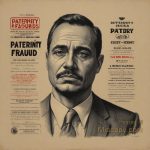The dynamics of human mating psychology are intricately woven with evolutionary imperatives that have shaped our species over millennia. Among the myriad factors influencing mate selection and reproductive strategies, one fundamental aspect that significantly impacts men’s mating psychology is the problem of paternal certainty. Unlike women, who possess absolute certainty of maternity through gestation and childbirth, men face inherent uncertainties regarding their paternity. This essay explores the evolutionary implications of paternal certainty, examining its role in shaping men’s mating behavior, relationship dynamics, and societal norms.
The Evolutionary Puzzle of Paternity:
Throughout human evolution, the issue of paternity has been a persistent puzzle, rooted in the inherent biological differences between males and females. For women, the act of giving birth establishes irrefutable genetic lineage, ensuring maternal certainty. In contrast, men lack such definitive markers of paternity, leading to uncertainty regarding the biological parentage of offspring. This fundamental asymmetry has profound implications for reproductive strategies and mate selection.
Evolutionary theorists argue that men have evolved psychological mechanisms to navigate the uncertainty of paternity and maximize their reproductive success. Strategies such as mate guarding, sexual jealousy, and paternal investment are hypothesized to have evolved as adaptive responses to mitigate the risks of cuckoldry and ensure genetic continuity. However, the efficacy of these strategies varies across cultures and contexts, underscoring the complex interplay between biology, culture, and individual psychology.
The Psychological Impact of Paternal Uncertainty:
The specter of paternal uncertainty casts a long shadow over men’s mating psychology, influencing their perceptions, behaviors, and relationship dynamics. Evolutionary psychologists posit that men are predisposed to exhibit mate-guarding behaviors and sexual jealousy as mechanisms to safeguard their paternity and deter rival males. Moreover, paternal investment—a crucial component of reproductive success—may be contingent upon perceived paternity certainty, shaping men’s willingness to invest resources in offspring.
However, the psychological toll of paternal uncertainty extends beyond reproductive concerns, impacting men’s emotional well-being and interpersonal relationships. The fear of cuckoldry, coupled with societal expectations of male paternity, can engender feelings of anxiety, insecurity, and mistrust in intimate relationships. Moreover, the stigma associated with infertility or reproductive challenges may exacerbate feelings of inadequacy and undermine men’s sense of masculinity and self-worth.
Navigating the Complexity of Modern Relationships:
In contemporary society, the dynamics of mating psychology are further complicated by cultural shifts, technological advancements, and changing gender roles. While paternity testing offers a scientific means of resolving uncertainties regarding biological parentage, its ethical implications and potential consequences for familial relationships warrant careful consideration. Moreover, evolving notions of masculinity and fatherhood challenge traditional narratives of male paternity and redefine the roles and responsibilities of men in modern families.
Conclusion:
The problem of paternal certainty stands as a fundamental aspect of human mating psychology, deeply rooted in our evolutionary history and shaping the dynamics of relationships and reproductive strategies. Understanding the evolutionary implications of paternal uncertainty offers insights into the complexities of men’s mating psychology and underscores the need for nuanced approaches to navigating modern relationships. By acknowledging the interplay between biology, culture, and individual psychology, we can foster greater empathy, understanding, and resilience in addressing the challenges posed by paternal uncertainty in contemporary society.





Leave a Reply